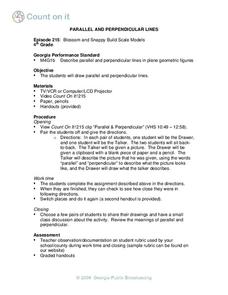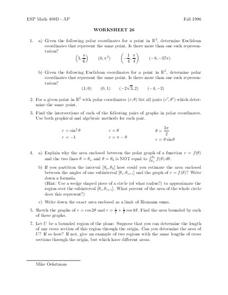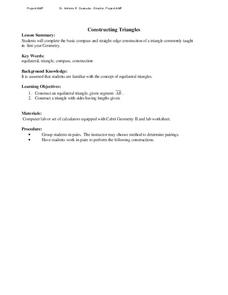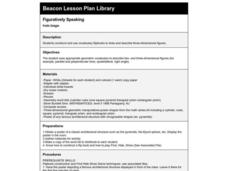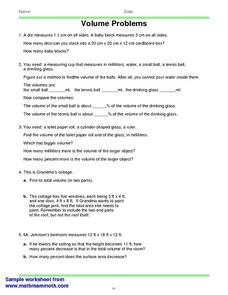Curated OER
Polygons - Sum of Interior Angles
For this polygon worksheet, learners determine the sum of the interior angles of a figure. Given the sum of the interior angles, they determine the number of sides of a polygon and the measure of one central angle. This one-page...
Curated OER
Classify and Identify Polygons
In this polygon worksheet, learners observe pictures of polygons and identify their proper name. They read descriptions of polygons and determine the polygon described. This one-page worksheet contains ten problems.
Curated OER
Parallel and Perpendicular Lines
Fifth graders complete activities to investigate parallel and perpendicular lines. In this plane geometry lesson, 5th graders watch a movie about parallel and perpendicular lines. Students work in pairs to describe and draw the lines in...
Curated OER
Measuring for Perimeter
Third graders find the perimeter of a polygon. In this measurement activity, 3rd graders use yardsticks to measure straight-lined objects to the nearest 1/2 inch. Student choose a "mystery object," find the perimeter, and record it on...
Curated OER
Triangle Angle-Sum Theorem
In this polygons instructional activity, students fill out a graphic organizer about the name of the polygon, the number of sides, the angle sums, and more. Students complete this for 5 polygons.
Curated OER
Polygons
In this polygon worksheet, students draw various polygons according to given specifications and find angle sums. A website reference for additional resources is given.
Curated OER
Worksheet 26
In this math worksheet, students use the polar coordinates to find the Euclidian coordinates. Then they compare points on the coordinate plane.
Curated OER
Constructing Triangles
Students construct triangles. In this geometry instructional activity, students create equilateral triangles. They also construct triangles where the sides are different. They use the lab to create and move shapes around with the Cabri...
Curated OER
SAS Similarity Theorem
Students identify and use the similarity theorem. In this geometry lesson, students differentiate between congruent and similar triangles. They solve problems using the computer modifying shapes by dragging.
EngageNY
Differences Due to Random Assignment Alone
It takes a lot of planning to achieve a random result! Learners compare results of random assignment, and conclude that random assignment allows results to be attributed to chance. They also realize the set of random means...
EngageNY
Ruling Out Chance (part 2)
Help your classes find the significance in this lesson! Learners analyze the probability of Diff values. They then determine if the difference is significant based on their probability of occurrence.
Virginia Department of Education
Analyzing and Interpreting Statistics
Use measures of variance to compare and analyze data sets. Pupils match histograms of data sets to their respective statistical measures. They then use calculated statistics to further analyze groups of data and use the results to make...
Science Geek
VSEPR and Molecular Geometry
Many chemistry jokes have no reaction. Presentation begins by explaining what models are and the limitations of various forms before introducing the VSEPR model. Then it outlines the rules for creating a VSEPR model and shows examples of...
Curated OER
Three Dimensional Figures
In this geometry worksheet, learners study diagrams with labels of common geometric figures. Students then answer 24 questions. Then they draw and label their own figures.
Curated OER
Figuratively Speaking
Third graders construct and use vocabulary flipbooks to draw and describe three-dimensional figures. They utilize worksheets and access websites imbedded in this plan which help them construct their books.
Pennsylvania Department of Education
Volume of Regular and Irregular Objects
Fifth graders examine patterns and relate to equations to solve math problems. In this patterns activity, 5th graders diagram, graph, use models and use tables to solve equations for real world problems.
Math Mammoth
Volume Problems
In this volume problem instructional activity, students determine the volume of various objects. They compare similar objects and determine the percent of increase and decrease of the surface area and volume. This one-page instructional...
Curated OER
Modeling the Keeling Curve with Excel
In this modeling the Keeling Curve worksheet, high schoolers use given data beginning in 1960 to create a mathematical model for the changes in atmospheric carbon dioxide over time. Students manipulate the equation to predict the carbon...
Curated OER
Identify Polygons: Algebra/Geometry Institute
Eighth graders classify geometric figures. In this polygon lesson, 8th graders identify given geometric figures. They compare and contrast different polygons. Students name line segments, identify parallel lines, and...
Raytheon
Geometry: Volume
In this geometry worksheet, 6th graders study comprehensive facts pertaining to volume and measurement of geometric, three-dimensional figures. Students solve for 59 problems showing their work.
Curated OER
3D Objects
In this math instructional activity, students solve six problems about 3D objects. Students also solve six problems about measuring 3D objects.
Curated OER
Cones, Cylinders, Spheres
Students classify polygons by name and shape. For this geometry lesson, students identify the lateral surface of each conic. They differentiate between cones, cylinders and spheres.
Curated OER
Give It a Whirl
Students examine and identify polyhedron shapes on a math website. They write journal reflections about two- and three-dimensional shapes, and transform a square into a pinwheel.
Curated OER
Get the Turtle to the Pond
Students solve problems. In this math lesson, students write solutions using LOGO commands in order to help get the turtle to the pond.


